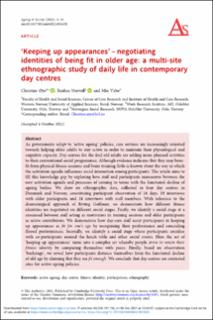'Keeping up appearances' - Negotiating identities of being fit in older age: A multi-site ethnographic study of daily life in contemporary day centres
Peer reviewed, Journal article
Published version
Permanent lenke
https://hdl.handle.net/11250/2833318Utgivelsesdato
2021Metadata
Vis full innførselSamlinger
Sammendrag
Abstract As governments adapt to ‘active ageing’ policies, care services are increasingly oriented towards helping older adults to stay active in order to maintain their physiological and cognitive capacity. Day centres for the frail old adults are adding more planned activities to their conventional social programmes. Although evidence indicates that they may benefit from physical fitness sessions and brain training, little is known about the way in which the activation agenda influences social interaction among participants. The article aims to fill this knowledge gap by exploring how staff and participants manoeuvre between the new activation agenda and processes of coming to terms with the functional decline of ageing bodies. We draw on ethnographic data, collected in four day centres in Denmark and Norway, constituting participant observation of 18 days, 19 interviews with older participants and 18 interviews with staff members. With reference to the dramaturgical approach of Erving Goffman, we demonstrate how different fitness identities are negotiated on different social stages. Firstly, we identify a social stage at a crossroad between staff acting as motivators in training sessions and older participants as active contributors. We demonstrate how day-care staff assist participants in keeping up appearances as fit for one’s age by recognising their performance and concealing flawed performances. Secondly, we identify a social stage where participants socialise with co-participants around the lunch table and other social events. Here the act of ‘keeping up appearances’ turns into a complex art whereby people strive to retain their fitness identity by comparing themselves with peers. Finally, based on observation ‘backstage’, we reveal how participants distance themselves from the functional decline of old age by claiming that they are fit enough. We conclude that day centres are contested sites for active-ageing policies.

